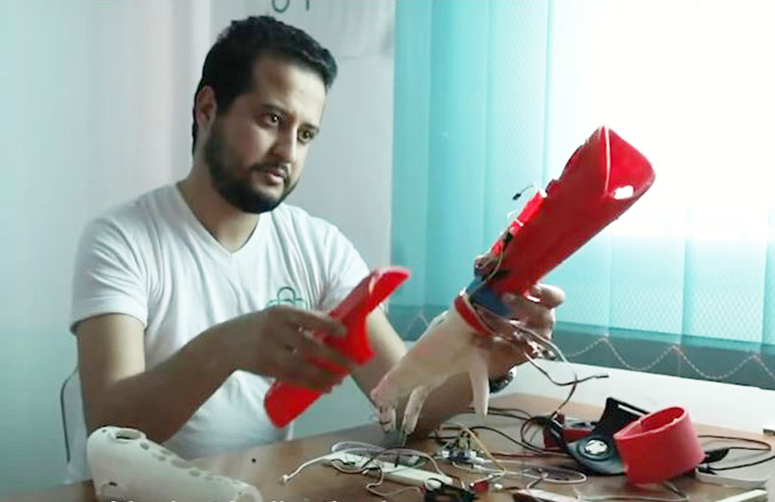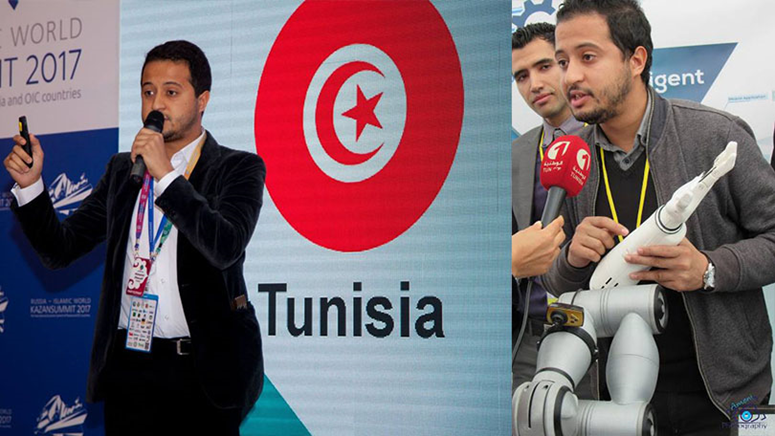He invented intelligent prosthetic limbs that receive commands from the brain...Tunisian inventor Mohamed Dhaoufi is among the leaders of the next generation

Tunisian engineer Mohamed Al-Dawafi was able to invent smart prosthetics that receive commands from the brain and respond to the needs of amputees with special needs without the need for surgery.
Al-Dhaoufi, an engineering graduate of the National School of Engineers in the coastal governorate of Sousse, who is no more than 30 years old and works in the field of producing smart prosthetics, specifically a “100% Tunisian prosthetic hand,” was able to create smart prosthetic limbs that receive commands from the brain and respond to the needs of amputees. People with special needs without resorting to surgery.
He was able to achieve this innovation in unconventional ways, as he was able to use 3D printing technology to manufacture limbs that operate using a smart sensor connected to the muscles that receives commands from the brain and is charged by solar energy, taking into account some of those who do not have electricity at home.

These prosthetic limbs for amputees enable people with special needs to wear them without the need for surgery. They can also be removed whenever they want. They are made according to the standards that amputees need and are in line with their needs and what they want.
The young man, Muhammad Al-Dhawafi, says that any child with amputated hands, who is 10 years old or older, aspires to have limbs like the limbs he sees in the “Batman” animated videos, adding: “Thanks to this innovation, he will be able to obtain it and will not feel like he is belittling himself or his abilities, and the price of the prosthetic hand, according to what Muhammad confirms, is about a thousand dollars.
Tunisian engineer Mohamed Al-Dawafi pointed out that this innovation won many awards during participation in international programs and forums concerned with innovation, and he is still seeking to develop it in accordance with the rapid technological development that the world is witnessing.

The British newspaper “The Times” also published an article on its website about the young Tunisian Mohamed Dhaoufi, whom it considered among the leaders of the next generation.
Al-Dhawafi was also chosen by the American financial and economic magazine “Forbes” as one of the 30 best innovative Arab youth under 30 years old.
He continued: “This innovation would help people with special needs, including hand amputees, to carry out their affairs without feeling helpless, as the smart prosthetic hand plays the role of a real hand and works as if it were real.”

Muhammad Al-Dawafi is a researcher at an emerging institution that produces prosthetic limbs using 3D printing technology. He confirms that there is a scarcity of funding for the project to develop prosthetic hands, and this is among the difficulties he faced to advance his project, noting that the funds he received were from outside Tunisia, specifically from international organizations. Encourages technological innovation.
Locally, Al-Dhawafi says, “Most of the awards it receives have not yet been received, in addition to the difficulty of finding a framework for this promising project, especially since Tunisia imports the mechanisms of this category of technology in hard currency.” Which does not take into account the purchasing power of people with special needs.”
Al-Dawafi stressed that “despite the promises he received from the official authority in Tunisia to support and inform his project, none of them materialized on the ground.”

Supporting youth competencies
Engineer Mohamed Al-Dawafi called on institutions working in the field of technology to invest in modern technologies and develop the talent of creativity and creativity among Tunisian youth, and to provide support and encouragement for such initiatives, which would value Tunisian intelligence and limit the migration of Tunisian talents abroad.
Source: websites

